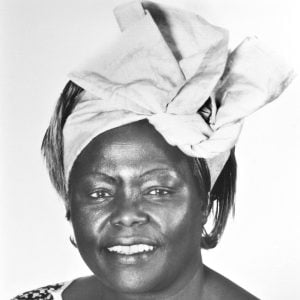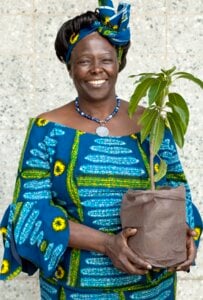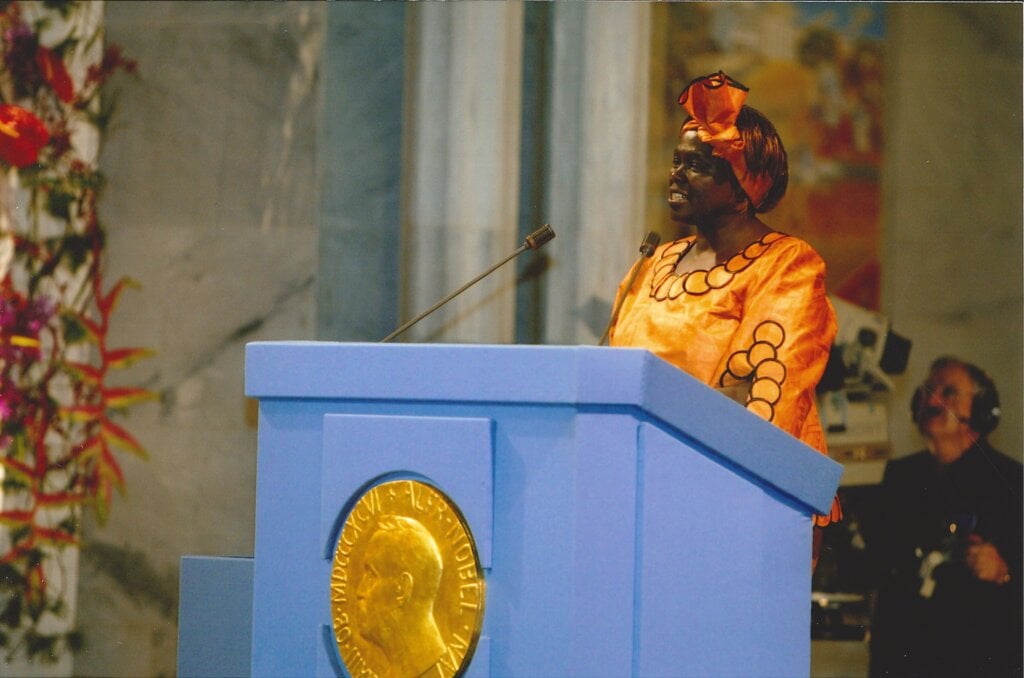Wangari Maathai
Speed read
Wangari Maathai was awarded the Nobel Peace Prize for her contribution to sustainable development, democracy and peace.

Full name: Wangari Muta Maathai
Born: 1 April 1940, Nyeri, Kenya
Died: 25 September 2011, Nairobi, Kenya
Date awarded: 8 October 2004
Peace prize for environmental sustainability
Wangari Maathai was the first African woman to receive the Nobel Peace Prize and the first laureate to have been selected for activities focused primarily on environmental sustainability. Educated as a biologist in the USA and Kenya, Maathai saw how deforestation and erosion were making life increasingly difficult for women in rural Kenyan villages in the 1970s. They were forced to walk miles to find wood for cooking fires, and livestock grasing grounds were becoming depleted. In 1977, Maathai founded the Green Belt Movement with the aim of regenerating Africa’s forests and ending the deprivation and conflict created by deforestation. The movement was a success, but the dictatorial Kenyan authorities tried to curb her efforts. She was harassed, beaten and jailed. Thus an environmental campaign became a fight for human rights.
”In its award to you, Wangari Maathai, of the Nobel Peace Prize for 2004, the Nobel Committee wishes to pay a special tribute to and express special support for the women of Africa and in the rest of the world.”
- Chairman of the Nobel Committee Ole Danbolt Mjøs, Presentation speech, 10 December 2004.
Prize for environmental work
Wangari Maathai was the first person to be awarded the peace prize mainly for environmental work. The Nobel Committee said that her tree-planting campaign would improve living conditions, helping to prevent war and conflict. The committee had, however, previously awarded the prize to Boyd Orr (1949) from the UK, and the American Norman Borlaug (1970), both of whom saw famine and poverty as key causes of conflict. And in 1989, when awarding the prize to the Dalai Lama, the committee had praised his environmental philosophy.

The Green Belt Movement
In 1972, the UN held its first conference on ecological issues in Stockholm and launched 5 June as World Environment Day. Wangari Maathai founded the Green Belt Movement on 5 June 1977. In rural African villages, most of the physical labour associated with daily living is carried out by women. Women quickly saw the positive impact that planting trees had on their meagre living conditions. Maathai helped to establish thousands of tree nurseries in rural villages to ensure a regular supply of seeds. The movement spread from Kenya to other African countries, and during the 1980s, women planted millions of trees.
”Although initially the Green Belt Movement’s tree planting activities did not address issues of democracy and peace, it soon became clear that responsible governance of the environment was impossible without democratic space.”
- Wangari Maathai, Nobel Prize lecture, 10 December 2004.

Struggle against a dictatorship
President Daniel arap Moi disliked Wangari Maathai’s environmental movement. His government had become accustomed to using Kenya’s natural resources at its own discretion. In 1989, Maathai prevented the construction of a skyscraper in a central Nairobi park, and she organised protest actions against the reallocation of state land for commercial use. She also showed her support for political prisoners. The demonstrations were met with violence, which was condemned by Amnesty International and the UN. Their protests had the desired effect. In 2002, Moi lost in free elections, and a year later Maathai became a cabinet minister.
Criticism of Maathai
Although Wangari Maathai received acclaim as a Nobel Peace Prize laureate, she was also criticised. Some claimed that her comments could be interpreted as blaming the West for the spread of the HIV virus in Africa. A Norwegian specialist in the area said that the Nobel Committee should not have awarded the peace prize to a person whose comments had created hatred among many Africans. Maathai replied that she had been misunderstood. She distanced herself from claims that the HIV virus had been created by white people in the West in order to destroy Africa’s population.
”Hail woman of Africa, you have done us all proud.”
- Mumbi Ngugi, The Standard, Nairobi, 9 October 2004.
Learn more
Wangari Muta Maathai was born in Nyeri, Kenya (Africa) in 1940. The first woman in East and Central Africa to earn a doctorate degree ...
Disclaimer: Every effort has been made by the publisher to credit organisations and individuals with regard to the supply of photographs. Please notify the publishers regarding corrections.
Nobel Prizes and laureates
Six prizes were awarded for achievements that have conferred the greatest benefit to humankind. The 12 laureates' work and discoveries range from proteins' structures and machine learning to fighting for a world free of nuclear weapons.
See them all presented here.
